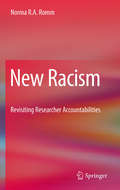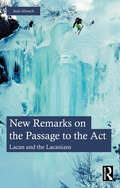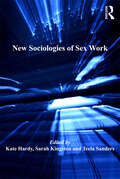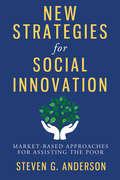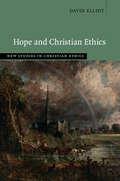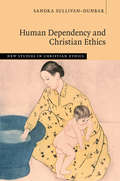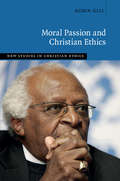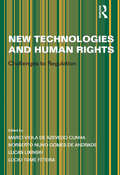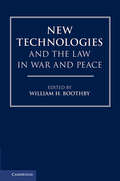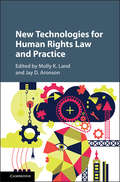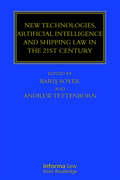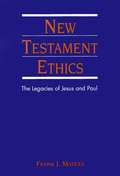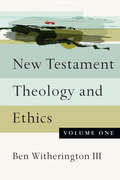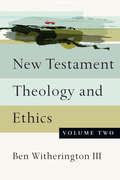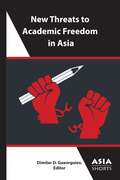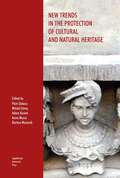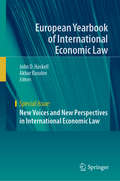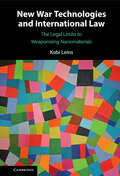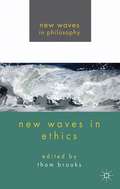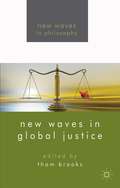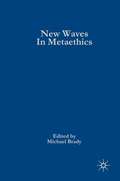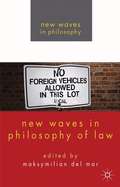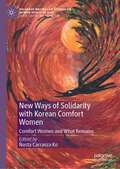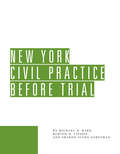- Table View
- List View
New Racism
by Norma RommThis book develops a debate around responsible social inquiry into new racism. A variety of ways of researching new forms of racism (for example, aversive, modern, cultural, purportedly color-blind, and new racism) are addressed. Experiments that have been undertaken to inquire into group identity and people's implicit bias in relation to those perceived as "other" are critically explored and their potential consequences reconsidered. The book also critically explores survey research, which, it is argued, can serve to reinforce the notion of the existence of ethnoracial groups with defined boundaries that inhere in social life. The book considers interviewing (including focus group interviewing) and case study research (including participant observation/ethnography) in terms of possibilities for moving beyond new forms of racism. Action research (defined by the understanding of an inextricable link between knowing and acting) is examined in-depth in terms of the hopes to "make a difference" at the moment of inquiry. Types of retroductive logic that are used to examine underlying structures that arguably unduly constrain people's life chances and render human relationships inhumane are also explored. The book draws together the different arguments; and it proposes ways in which the design of research into new racism can better approached as well as ways in which dialogue around processes of inquiry and the products thereof can be better fostered. Suggestions for nurturing humane social relationships that provide for transcultural meaning-making are threaded through the text.
New Remarks on the Passage to the Act: Lacan and the Lacanians
by Jean AllouchNew Remarks on the Passage to the Act considers what happens when psychoanalysis and the social sciences are called on to help modern societies overwhelmed by unexplained violence.Jean Allouch examines key events – the crimes of the Papin sisters, Lacan’s case of Aimée and the murder of Hélène Rytmann by Louis Althusser – and unpacks the concept of the "passage to the act". The book assesses these classic cases, resorting to contemporaneous studies and literature, particularly discussing Marguerite Duras’ novel L’Amante Anglaise. The book also considers modern acts of terrorism.New Remarks on the Passage to the Act will be of great interest to clinicians, academics and scholars of psychoanalysis, Lacanian studies, sociology, cultural studies and philosophy, and to Lacanian analysts in practice and in training.
New Sociologies of Sex Work
by Kate Hardy Sarah KingstonSex work studies have seen an expansion in publications over the past decade, drawing together disciplines from across the social sciences, namely sociology, criminology and social policy. There has, however, been a tendency for research and writing to focus on the more obvious aspect of the sex industry - the visible elements of female street prostitution and those features which attract media attention such as the criminalised aspects of the sex trade. The sex industry is diverse in terms of its organisation, presentation, participants and how it is located in the broader context of globalisation and regulation; there is a need for publications which demonstrate this breadth. This book makes an outstanding contribution to the sociology of sex work through advancing theoretical, policy, methodological and empirical ideas as each chapter pushes the boundaries of a specific area by offering new and critical research as well as commentary.
New Strategies for Social Innovation: Market-Based Approaches for Assisting the Poor
by Anderson Steven G.This book is the first to assess emerging market-based social change approaches comparatively, focusing specifically on social entrepreneurship, corporate social responsibility, fair trade, and private sustainable development
New Studies in Christian Ethics: Hope and Christian Ethics (New Studies in Christian Ethics)
by David ElliotThe theological virtue of hope has long been neglected in Christian ethics. However, as social, civic and global anxieties mount, the need to overcome despair has become urgent. This book proposes the theological virtue of hope as a promising source of rejuvenation. Theological hope sustains us from the sloth, presumption and despair that threaten amid injustice, tragedy and dying; it provides an ultimate meaning and transcendent purpose to our lives; and it rejoices and refreshes us 'on the way' with the prospect of eternal beatitude. Rather than degrading this life and world, hope ordains earthly goods to our eschatological end, forming us to pursue social justice with a resilience and vitality that transcend the cynicism and disillusionment so widespread at present. Drawing on Thomas Aquinas and virtue ethics, the book shows how the virtue of hope contributes to human happiness in this life and not just the next.
New Studies in Christian Ethics: Human Dependency and Christian Ethics (New Studies in Christian Ethics)
by Sullivan-Dunbar SandraDependency is a central aspect of human existence, as are dependent care relations: relations between caregivers and young children, persons with disabilities, or frail elderly persons. In this book, Sandra Sullivan-Dunbar argues that many prominent interpretations of Christian love either obscure dependency and care, or fail to adequately address injustice in the global social organization of care. Sullivan-Dunbar engages a wide-ranging interdisciplinary conversation between Christian ethics and economics, political theory, and care scholarship, drawing on the rich body of recent feminist work reintegrating dependency and care into the economic, political, and moral spheres. She identifies essential elements of a Christian ethic of love and justice for dependent care relations in a globalized care economy. She also suggests resources for such an ethic ranging from Catholic social thought, feminist political ethics of care, disability and vulnerability studies, and Christian theological accounts of the divine-human relation.
New Studies in Christian Ethics: Moral Passion and Christian Ethics
by Robin GillIn this book, Robin Gill argues that moral passion and rational ethical deliberation are not enemies, and that moral passion often lurks behind many apparently rational ethical commitments. He also contends that though moral passion is a key component of truly selfless moral action, without rational ethical deliberation it can also be extremely dangerous. Gill maintains that a reanalysis of moral passion is overdue. He inspects the gap between the 'purely rational' accounts of ethics provided by some moral philosophers and the normative positions that they espouse and/or the moral actions that they pursue. He also contends that Christian ethicists have not been adept at identifying their own implicit moral passion or at explaining why it is that doctrinal positions generate passionately held moral conclusions. Using a range of disciplines, including cognitive science and moral psychology, alongside the more usual disciplines of moral philosophy and religious ethics, Gill also makes links with moral passion in other world faith traditions.
New Studies in European History: West Germany, Cold War Europe and the Algerian War
by Von Bülow MathildeAn illuminating and provocative account of Germany's role as sanctuary for Algerian nationalists during their fight for independence from France between 1954 and 1962. The book explores key issues such as the impact of external sanctuaries on French counterinsurgency efforts; the part played by security and intelligence services in efforts to eliminate these sanctuaries; the Algerian War's influence on West German foreign and security policy; and finally, the emergence of West German civic engagement in support of Algeria's independence struggle, which served to shape the newly independent country's perception of its role and place in international society. Mathilde von Bulow sheds new light on the impact of FLN activities, the role of anti-colonial movements and insurgencies in the developing world in shaping the dynamics of the Cold War as well as the manner in which the Algerian War was fought and won.
New Technologies and Human Rights: Challenges to Regulation
by Norberto Nuno Andrade Lúcio Tomé FéteiraWhilst advances in biotechnology and information technology have undoubtedly resulted in better quality of life for mankind, they can also bring about global problems. The legal response to the challenges caused by the rapid progress of technological change has been slow and the question of how international human rights should be protected and promoted with respect to science and technology remains unexplored. The contributors to this book explore the political discourse and power relations of technological growth and human rights issues between the Global South and the Global North and uncover the different perspectives of both regions. They investigate the conflict between technology and human rights and the perpetuation of inequality and subjection of the South to the North. With emerging economies such as Brazil playing a major role in trade, investment and financial law, the book examines how human rights are affected in Southern countries and identifies significant challenges to reform in the areas of international law and policy.
New Technologies and the Law in War and Peace
by William H. BoothbyPolicymakers, legislators, scientists, thinkers, military strategists, academics, and all those interested in understanding the future want to know how twenty-first century scientific advance should be regulated in war and peace. This book tries to provide some of the answers. Part I summarises some important elements of the relevant law. In Part II, individual chapters are devoted to cyber capabilities, highly automated and autonomous systems, human enhancement technologies, human degradation techniques, the regulation of nanomaterials, novel naval technologies, outer space, synthetic brain technologies beyond artificial intelligence, and biometrics. The final part of the book notes important synergies that emerge between the different technologies and legal provisions, existing and proposed, assesses notions of convergence and of composition in international law, and provides some concluding remarks. The new technologies, their uses, and their regulation in war and peace are presented to the reader who is invited to draw conclusions.
New Technologies for Human Rights Law and Practice
by Jay D. Aronson Molly K. LandNew technological innovations offer significant opportunities to promote and protect human rights. At the same time, they also pose undeniable risks. In some areas, they may even be changing what we mean by human rights. The fact that new technologies are often privately controlled raises further questions about accountability and transparency and the role of human rights in regulating these actors. This volume – edited by Molly K. Land and Jay D. Aronson – provides an essential roadmap for understanding the relationship between technology and human rights law and practice. It offers cutting-edge analysis and practical strategies in contexts as diverse as autonomous lethal weapons, climate change technology, the Internet and social media, and water meters. This title is also available as Open Access.
New Technologies, Artificial Intelligence and Shipping Law in the 21st Century (Maritime and Transport Law Library)
by Andrew Tettenborn Bar 305 351 Professor SoyerNew Technologies, Artificial Intelligence and Shipping Law in the 21st Century consists of edited versions of the papers delivered at the Institute of International Shipping and Trade Law’s 14th International Colloquium at Swansea Law School in September 2018. Written by a combination of top academics and highly experienced legal practitioners, these papers have been carefully co-ordinated to give the reader a first-class insight into the issues surrounding new technology and shipping. The book is set out in three parts: Part I offers a detailed and critical analysis of issues that are emerging, and those that are likely to emerge, from the use of advanced computer technology, particularly at the contracting process and in the context of issuing trading documents. Part 2 focusses on artificial intelligence and discusses the contemporary issues that will emerge once autonomous ships and similar crafts are put to use in the world’s oceans. As well as this, the legal impact of ports utilising artificial intelligence and computer technology will also be considered. Part 3 analyses how the increasing use of legal technology is changing insurance underwriting and shipping litigation. An invaluable guide to the recent technological advances in shipping, this book is vital reading for both professional and academic readers.
New Testament Ethics: The Legacies Of Jesus And Paul
by Frank J. MateraNeither Jesus nor Paul developed a formal ethical system, yet each left a moral legacy that forms the core of New Testament ethics. In this book, Frank Matera examines the ethic found in the teachings of Jesus and Paul. He explores the broad range of moral concerns found in these writings and finds an identifiable unity that underlies the ethical teachings of both.
New Testament Theology and Ethics (New Testament Theology And Ethics Ser. #Volume 1)
by Ben Witherington IIIAll too often, argues Ben Witherington, the theology of the New Testament has been divorced from its ethics, leaving as isolated abstractions what are fully integrated, dynamic elements within the New Testament itself. As Witherington stresses, "behavior affects and reinforces or undoes belief." Having completed commentaries on all of the New Testament books, a remarkable feat in itself, Witherington now offers the first of a two-volume set on the theological and ethical thought world of the New Testament. The first volume looks at the individual witnesses, while the second examines the collective witness. The New Testament, says Ben Witherington, is "like a smallish choir. All are singing the same cantata, but each has an individual voice and is singing its own parts and notes. If we fail to pay attention to all the voices in the choir, we do not get the entire effect. . . . If this first volume is about closely analyzing the sheet music left to us by which each musician's part is delineated, the second volume will attempt to re-create what it might have sounded like had they ever gotten together and performed their scores to produce a single masterful cantata." What the New Testament authors have in mind, Witherington contends, is that all believers should be conformed in thought, word and deed to the image of Jesus Christ--the indelible image.
New Testament Theology and Ethics (New Testament Theology and Ethics #Volume 2)
by Ben Witherington IIIAll too often, argues Ben Witherington, the theology of the New Testament has been divorced from its ethics, leaving as isolated abstractions what are fully integrated, dynamic elements within the New Testament itself. As Witherington stresses, "behavior affects and reinforces or undoes belief." Having completed commentaries on all of the New Testament books, a remarkable feat in itself, Witherington now offers the second of a two-volume set on the theological and ethical thought world of the New Testament. The first volume looks at the individual witnesses, while the second examines the collective witness. The New Testament, says Ben Witherington, is "like a smallish choir. All are singing the same cantata, but each has an individual voice and is singing its own parts and notes. If we fail to pay attention to all the voices in the choir, we do not get the entire effect. . . . [If the first volume was] about closely analyzing the sheet music left to us by which each musician's part is delineated, [this second volume attempts] to re-create what it might have sounded like had they ever gotten together and performed their scores to produce a single masterful cantata." What the New Testament authors have in mind, Witherington contends, is that all believers should be conformed in thought, word and deed to the image of Jesus Christ--the indelible image.
New Threats to Academic Freedom in Asia (Asia Shorts)
by Dimitar D. GueorguievNew Threats to Academic Freedom in Asia examines the increasingly dire state of academic freedom in Asia. Using cross-national data and in-depth case studies, the authors shed light on the multifaceted nature of academic censorship and provide reference points to those working in restrictive academic environments.
New Trends in the Protection of Cultural and Natural Heritage
by Piotr Dobosz, Witold Górny, Adam Kozień, Anna Mazur, Bartosz MazurekThe book entitled New Trends in the Protection of Cultural and Natural Heritage is a collection of twelve scientific articles (chapters) authored by Polish and foreign researchers in the field of cultural heritage protection. Specializing in various scientific disciplines (including legal, architectural, managerial, cultural studies considerations) and at different stages of scientific development, the authors of the individual texts from either a casuistic (case studies) or systemic (studies of normative solutions or development trends) perspective analyze new trends in the protection of cultural and natural heritage.
New Voices and New Perspectives in International Economic Law (European Yearbook of International Economic Law)
by John D. Haskell Akbar RasulovThis book brings together a series of contributions by international legal scholars that explore a range of subjects and themes in the field of international economic law and global economic governance through a variety of methodological and theoretical lenses. It introduces the reader to a number of different ways of constructing and approaching the study of international economic law. The book deals with a series of different theoretical agendas and perspectives ranging from the more traditional (empirical legal studies) to the more alternative (language theory) and it expands the scope of substantive discussion and thematic coverage beyond the usual suspects of international trade, international investment and international finance. While the volume still gives due recognition to the traditional theoretical project of international economic law, it invites the reader to extend the scope of disciplinary imagination to other, less commonly acknowledged questions of global economic governance such as food security, monetary unions, and international economic coercion. In addition to historically-focused and critical perspectives, the volume also includes a number of programmatic and forward-looking explorations, which makes it appealing to a broad audience with a variety of contrasting interests. Therefore, the volume is of particular interest to academics and postgraduate students in the fields of international law, international relations, international political economy, and international history.
New War Technologies and International Law: The Legal Limits to Weaponising Nanomaterials
by Kobi LeinsThe desire for humanity and the desire for security have co-existed as long as humans have been alive. As science has become increasingly sophisticated, so have the methods of self-defence by States. Nanotechnology is already changing warfare by increasing capabilities upon which armed forces are heavily reliant: more efficient energy storage, advanced photovoltaics, and improved military protective equipment to name a few of these developments. Some applications of nanomaterials by the military are both powerful and subtle, and have neurological and biological applications: 'devices that can infiltrate electronics and seize control at crucial moments, artificial 'disease' agents that can rest harmlessly in victims' bodies until activated by an external signal'. The advance of the use or contemplation of use of these types of nanoscale applications by the military requires urgent analysis in light of existing international law, particularly in light of their potential effects on humans and on the environment.
New Waves in Ethics
by Thom BrooksBringing together the leading future figures in ethics broadly construed with essays ranging from metaethics and normative ethics to applied ethics and political philosophy, topics include new work on experimental philosophy, feminism, and global justice incorporating perspectives informed from historical and contemporary approaches alike.
New Waves in Global Justice
by Thom BrooksWith essays ranging from climate change and global poverty to just war and human rights and immigration, leading future figures present an ideal collection for anyone interested in the most important debates in global justice.
New Waves in Metaethics
by Michael BradyMetaethics occupies a central place in analytical philosophy, and the last forty years has seen an upsurge of interest in questions about the nature and practice of morality. This collection presents original and ground-breaking research on metaethical issues from some of the very best of a new generation of philosophers working in this field.
New Waves in Philosophy of Law
by Maksymilian Del MarA collection of 11 cutting-edge essays by leading young scholars, challenging long-held assumptions and offering new research paradigms in Philosophy of Law - in five parts 1) methodology/metatheory; 2) reasoning/evaluating; 3) values/the moral life; 4) institutions/the social life; and 5) the global/international dimension.
New Ways of Solidarity with Korean Comfort Women: Comfort Women and What Remains (Palgrave Macmillan Studies on Human Rights in Asia)
by Ñusta Carranza KoThis book provides a space for victims’ testimonies and memories, engages with their experiences, reflects upon the redress movement, and evaluates policies related to Korean comfort women as victims and survivors from the international, domestic, and bilateral realms. Collectively, this edited volume aims to further diversify the scholarship on comfort women, contribute to the existing literature on social movements related to comfort women and other related studies, and, in doing so, challenge the politicization of comfort women. With this objective, the book presents scholarship from interdisciplinary fields that revisit the meaning of victims’ testimonies, memories, and remembrance, social movement efforts on comfort women, and the related role of government, governance, and society by reflecting on the truths about the historical past. In so doing, it initiates new conversations among political scientists, sociologists, historians, and cultural and literary scholars. What do victims’ testimonies reveal about new ways of imagining historical memory of Korean comfort women? How are memories of comfort women and their experiences remembered in social movements, literature, and cultural practices? Where is the place of comfort women’s experiences in politics, diplomacy, and global affairs? These are some of the questions that guide the contributions to this edited volume, which seek to establish new ways of solidarity with comfort women.
New York Civil Practice Before Trial
by Michael H. BarrStep-by-step procedures, answers to knotty questions, tips from the bench, 3,500 citations, and over 130 forms, all designed to help you quickly find detailed and authoritative answers to difficult questions concerning pleadings, motions, discovery, and more.
